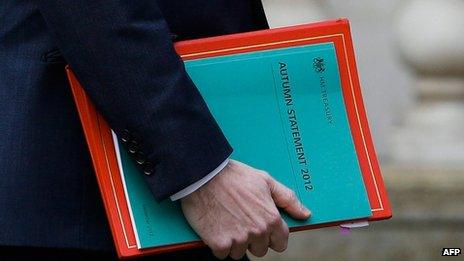Autumn Statement: Carrot and stick for business
- Published
- comments

The two big challenges for George Osborne today were to do something to wake the UK economy from the torpor that has afflicted it since 2008, while also persuading investors of the world that lending to the government remains a prudent thing to do.
How has he set about it?
Well he has another go at trying to restart business investment, which has been so spectacularly disappointing over the past few years.
The chancellor is using the forecast £3.5bn of proceeds from the auction to mobile phone companies of broadcasting spectrum for their 4G broadband services to give some temporary tax cuts to business - of which the most eye-catching is an increase for two years in the annual investment allowance from £25,000 to £250,000.
At a cost of around £2bn, this provides a valuable tax incentive for investment to small and medium size businesses.
There is a further tax cut of greater political symbolism, which is that corporation tax will be cut by one percentage point more than expected in April 2014. That would take the rate of corporation tax to 21% - and makes it almost inevitable that by the time of the 2015 election, the mainstream rate of corporation tax will be 20%.
And as some of you may become tired of hearing in the coming weeks, month and years, a corporation tax rate of 20% would be the joint lowest rate of any of the large G20 economies.
Of course, not all businesses can celebrate a reduction in the tax burden.
The chancellor is trying to make it harder for multinationals to shuffle their costs and revenues around the globe to minimise the amount of corporation tax they pay to him.
And he still regards any tax cuts for banks as toxic. So the bank levy is being increased to sustain the net annual proceeds from the levy at £2.5bn.
Nor is Mr Osborne playing Santa for business leaders as individuals. He is increasing taxes raised from those on high earnings by a £1bn a year, through the device of limiting the tax relief they can enjoy on pension saving.
And what about investors?
Well they won't regard it as good news that it will take a further year for the ratio of national debt to GDP to start falling: on the projections of the Office for Budget Responsibility, debt will reach a peak of 79.9% of GDP in 2015/16, before falling to a still high 79.2% in 2016/17.
But that deterioration is not unexpected.
Which is partly why, for some time now, investors have been expecting the UK to lose its AAA credit rating, the government's cherished kitemark as one of the world's most trusted borrowers
That fear, of a loss of the AAA, has not diminished, and looks likely to happen in early 2013.
Which would be a big political embarrassment for George Osborne and David Cameron, who have spent the past couple of years flaunting the AAA.
But the cost may be largely a political one, for the coalition, rather than an economic one: there has already in recent weeks been a smallish rise in the long-term costs of borrowing for the Treasury, which may be markets discounting the ratings downgrade.
Update 17.05
What the chancellor needs, more than anything else, if he is to hit debt targets that are - yet again - worse than previous forecasts, is an economic recovery.
And for that he needs a private sector that feels more confident and starts investing again.
So, at the heart of his statement today were a series of measures designed to appeal to the fabled business community.
There is £2bn worth of 100% tax relief on investment of up to £250,000 for two years.
There is an extension of relief on business rates for smaller businesses.
And perhaps most eye-catchingly of all, there is a further 1% to be taken off the standard rate of corporation tax - which will fall to 21% in 2014.
Which almost certainly means that by the time of the next general election, the UK will have a 20% tax rate for companies - which would be the joint lowest of all the big G20 economies.
Also, Mr Osborne announced what he hopes will be a significant boost to spending on infrastructure - which many businesses have been calling for.
All that said, many business people will be in two minds whether to crack open the bubbly.
Many of them - especially those in middle management - will be hurt by a £1bn raid on tax relief for those on higher earnings saving for a pension.
And they may worry more than most about the symbolism for the British government of losing its AAA credit rating - which now looks likely to happen in the early months of next year - following the deterioration of growth prospects and public finances.
They may also query whether the chancellor is engaging in the kind of creative accounting that gets some fast-and-loose businesses into trouble - by the way he is banking and spending £3.5bn of proceeds from an auction of 4G broadband spectrum that hasn't happened yet.